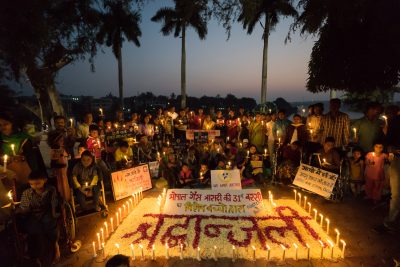
Sign our open letter to the board of DowDuPont #DontBuryBhopal : CLICK
Before 2017, a total of five notices to attend the Bhopal Chief Judicial Magistrate’s Court (CJM) were served on Dow Chemical. The US multinational chemical corporation is required to explain why its wholly-owned subsidiary, the Union Carbide Corporation, has never appeared before the court to answer the criminal charges of culpable homicide which remain outstanding 32 years after the disaster.
None of the American accused have ever shown for trial to face charges in connection with the disaster and apparent violations of a bilateral Mutual Legal Assistance Treaty, on the part of the US Government, had been preventing due process being exercised with every notice sent from Bhopal stalled with the US Department of Justice.
But, in January 2017, the CJM in Bhopal, issued summons directly, via email, to Amy Wilson, corporate secretary of Dow. Ms. Wilson did not attend the court and neither did she attend a second hearing to which she was summoned. A third summons was issued, requiring Ms.Wilson to attend court in Bhopal on the 15th November 2017, but this has been postponed until the 15th December.
Audrey Gaughran, Amnesty International’s Director for Global Issues, said: “The time has come for Dow to appear in an Indian court and account for the failure of its wholly-owned subsidiary, Union Carbide, to respond to the criminal charges against it.”
Earlier this year, a New York class action, based on claims initiated by Bhopal residents, appears to have reached the end of the road in what can only be described as controversial circumstances, when a New York Court of Appeals rejected a petition for rehearing without a single comment.
The experience has left behind the sense of a judicial process highly affected by the politics of multinational commerce. The lawsuit “has not been treated like other pollution cases”, asserted legal NGO Earthrights, which worked with survivor plaintiffs on the case, “and the courts have ignored legal doctrines that should establish Union Carbide’s responsibility.”
Campaigners remain confident that legal redress may still remain possible in the criminal courts whilst a hearing is expected to be announced imminently for an Indian Government curative petition aiming to address what the Indian Government describes as the ‘gross inadequacy’ of the 1989 settlement with UCC which resulted in an ‘irremediable injustice’.
If things go the way of the disaster survivors, in the curative petition, then Dow Chemical may find itself liable for anything up to $8billion.
Bhopal-related court cases in which Dow or Union Carbide are involved:
https://www.bhopal.org/the-dow-chemical-companys-bhopal-related-legal-liabilities/
History of Sahu II NY class action: https://www.bhopal.org/sahu-ii/
History of Bano, Sahu I & II class actions: https://www.bhopal.org/brief-history-of-the-three-class-actions/
A flawed legal defence: https://www.bhopal.org/dows-flawed-legal-defence-exposed


